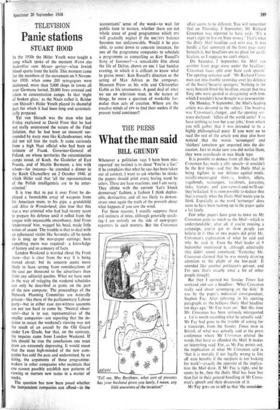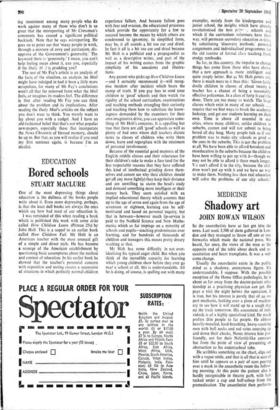What the man said
THE PRESS BILL GRUNDY
Whenever a politician says 'I have been mis- reported' my instinct is to shout 'You're a liar: If he complains that what he says has been taken out of context, I want to ask whether he thinks the papers should print every boring word be utters. These are base reactions, and I am sorry. They chime with the current 'Let's knock democracy' fashion, a fashion I think deplor- able, destructive, and all too likely to demon- strate once again the truth of the proverb about what happens if you sow the wind.
For those reasons, I usually suppress these evil instincts of mine, although generally speak- ing • I am entirely on the side of newspaper reporters in such matters. But the Crossman 'Tell me, Mrs Brezhnev, what sort of presents . has your husband given you lately, I mean, any little souvenirs of the invasion?' affair seems to be different. You will remember that on Thursday, 5 September, Mr Richard Crossman was reported to have said: 'It's a man's right to live on State money.' That's what the Daily Mail headline said next day. It was hardly a fair summary of the front page story beneath it, but headlines are no place for quali- fication, so I suppose we can't object.
On Saturday, 7 September, the Mail ran another front page story under the headline : 'Crossman faces split over State cash speech.' The opening sentence said : 'Mr Richard Cross- man ran into trouble yesterday over his defence of the Social Security spongers.' Nothing in the story beneath fitted the headline, except that two Tory Nos were quoted as disagreeing with him. which I wouldn't have thought was newsworthy.
On Monday, 9 September, the Mail's leading article was devoted to the subject. The heading was 'Crossman's clanger. and the opening sen- tence declared : 'Idlers of the world unite! You have nothing to lose but your jobs,' from which you will gather that it was intended to be a highly philosophical piece. If you went on to read the rest of the article you may also have noticed that the words 'scroungers' and `shirkers' somehow got imported into the dis- cussion. Just to make sure you did notice them, they were crossheads in nice black type.
It is possible to deduce from all this that Mr Crossman has made a silly speech—it wouldn't be the first time—and that the Daily Mail, is being vigilant in our defence against minis- terially-encouraged shirkers. loafers, idlers, vagabonds, scroungers. layabouts, parasites,, ticks, tramps, and you-name-it-and-we'll-see- they're-kicked. It is even possible to deduce that that is exactly what the Daily Mail wants you to think. Especially as the word 'scrounger' does seem to have been turning up in the paper quite a lot lately.
Few other papers have gone to town on Mr Crossman quite as much as the Mail—which is understandable: after all, if you're running a campaign, you've got to show people you believe in it. One or two papers did print Mr. Crossman's explanation of what he said and why he said it. Even the Mail leader of 9 September mentioned it, although admittedly they didn't sound convinced; 'Yesterday Mr. Crossman claimed that he was merely drawing attention to the plight of the low-paid.' ft sounded like another politician's get-out, and I'm sure that's exactly what a lot of other people thought.
But then I opened my Sunday Times last weekend and saw a headline: 'What Crossman really said about scrounging on the dole.' It was by the paper's industrial correspondent, Stephen Fay. After referring, in his opening paragraph, to 'the bellicose Daily Mail headline ten days ago,' Mr Fay went on : 'But this time Mr. Crossman has been seriously misreported a. it is worth recording what he actually said.' Mr Fay had gone to the trouble of asking for a transcript, from the Sunday Times man in Bristol, of what was actually said at the press conference where Mr Crossman uttered the words that have so offended the Mail. It makes an interesting read. For, as Mr Fay points out, the implication of what Mr Crossman said is `that it is morally if not legally wrong to live off state benefits if the recipient is not looking for work'—exactly the opposite of the implica- tion the Mail drew. If Mr Fay is right, and he seems to be, then the Daily Mail has been less than fair in their general handling of Mr Cross-, man's speech and their discussion of it.
Mr Fay goes on to tell us that 'the smoulder- ing resentment among many people who do work against many of those who don't is so great that the misreporting of Mr Crossman's comments has caused a significant political backlash.' Note that he says misreporting. He goes on to point out that 'many people in work, through a mixture of envy and puritanism, dis- approve of the Government's generosity.' The keyword there is 'generosity.' I mean, you can't help feeling mean about it, can you, especially if the Daily M SI is prodding you?
The rest of Mr Fay's article is an analysis of the facts of the situation, an analysis the Mail might have indulged in had it been a little more scrupulous, for many of Mr Fay's conclusions aren't all that far removed from what the Mail feels, or imagines its readers feel. The difference is that after reading Mr Fay you can think about the problem and its implications. After reading the Daily Mail's articles on the subject you don't want to think. You merely want to lay about you with a cudgel. And I have an old-fashioned belief that that's not what popular newspapers, especially those that incorporate the News Chronicle of blessed memory, should be up to. But that, as you will realise if you read my first sentence again, is because I'm an idealist.











































 Previous page
Previous page